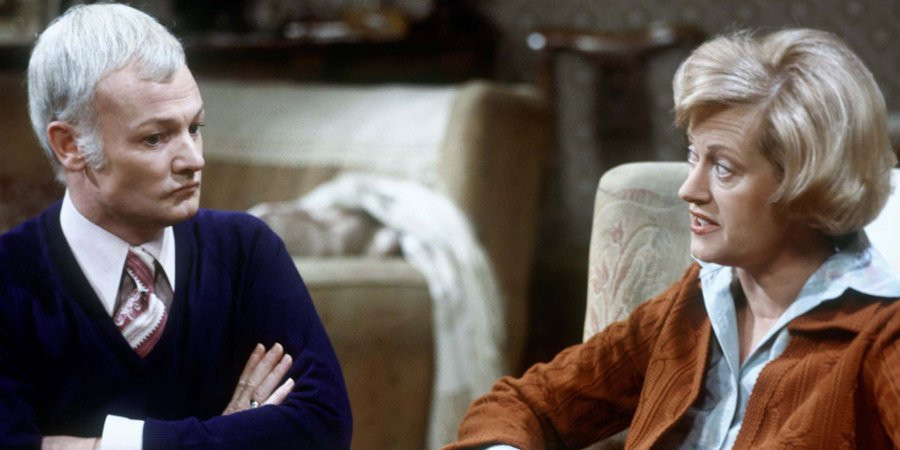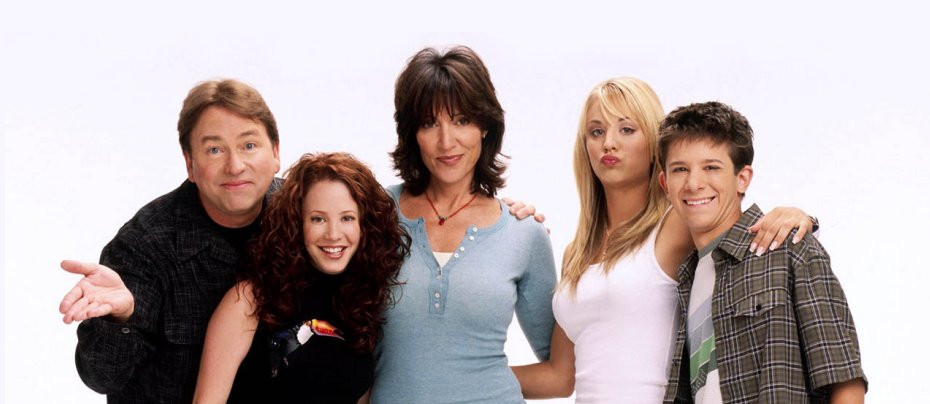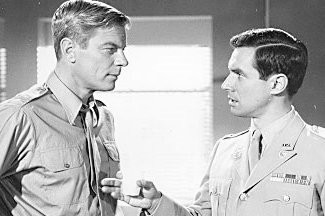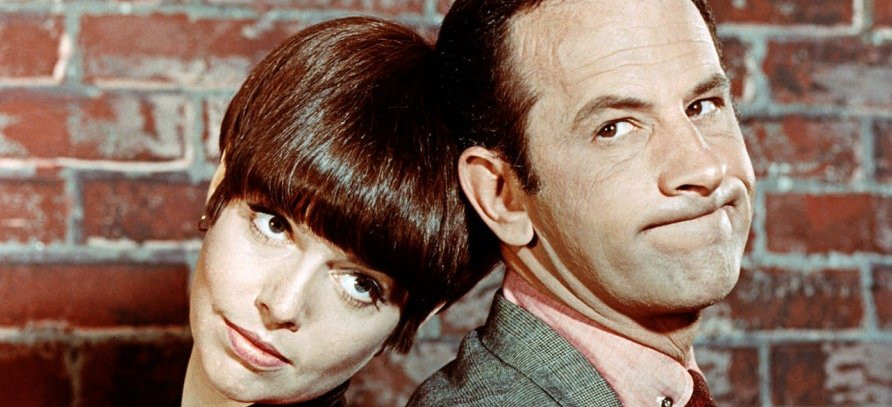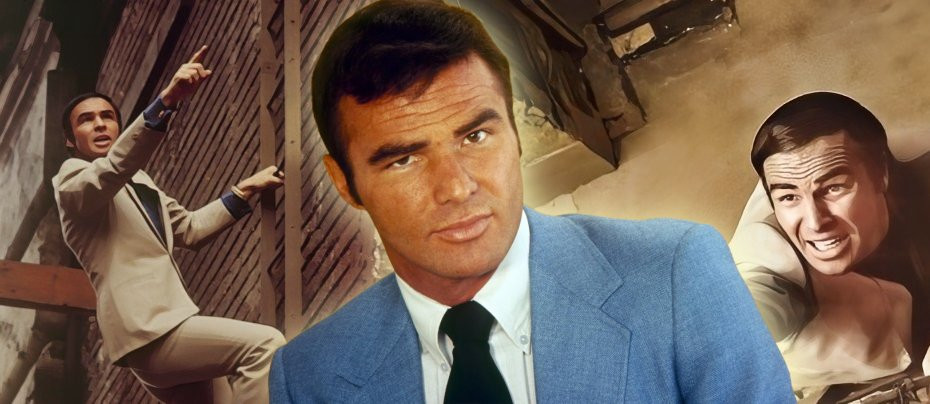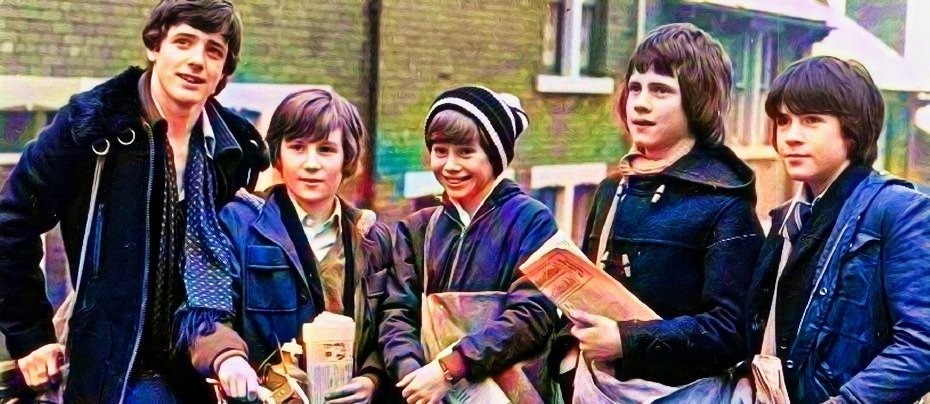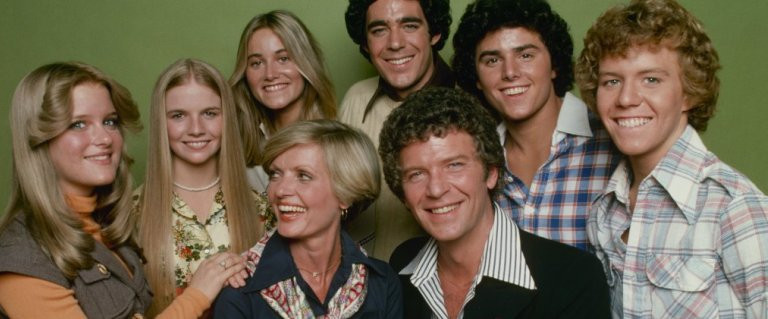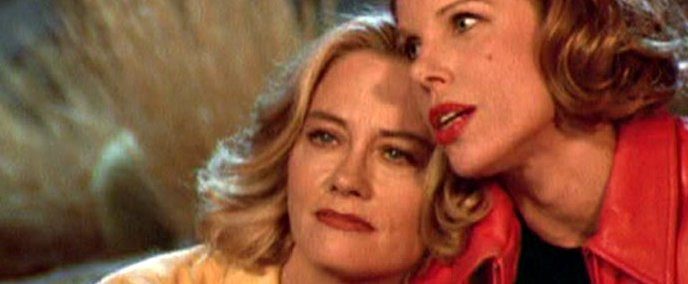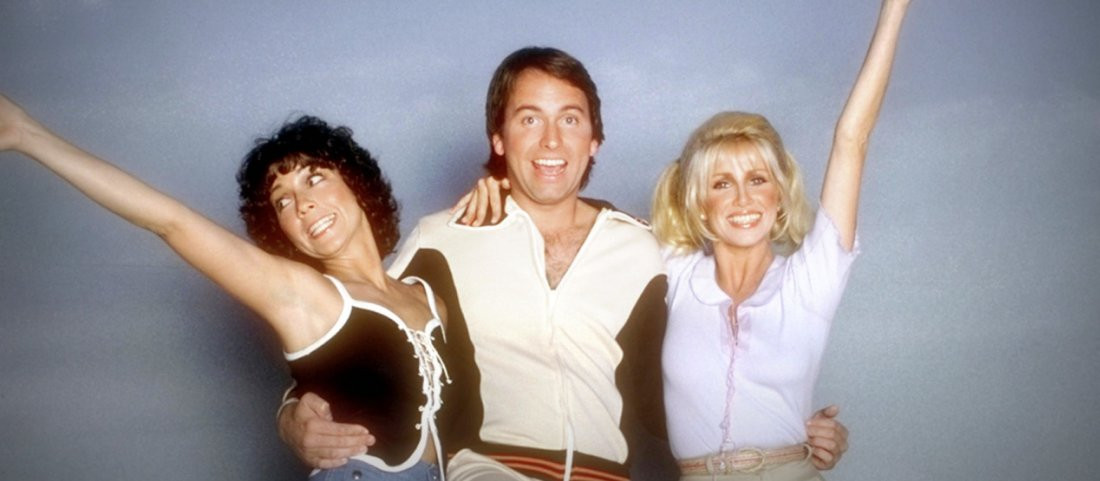
Three's Company
1977 - United StatesTelevision author Rick Metz wrote that in America, there are three schools of thought about Three's Company: "First, that it is, quite simply, the worst piece of sitcom trash that's ever been on television. Second, that it is, quite simply, the worst piece of trash that's ever been on television. Third, that it is, quite simply, the worst piece of trash that's ever been on the face of the earth".
That's rather harsh, in my opinion. Over 40 years after its debut, Three's Company still has a hold on many comedy fans. Sure, the show had its faults--obvious by-the-book plots and a heavy-handed approach (for its time) about sex. But those flaws were counterbalanced by a fine cast, lots of physical humour and a spirited feel that gave the show a contagious energy. That, despite some bad karma behind the scenes.
In the mid-1970's, producers Ted Bergman and Don Taffner bought the rights to the British comedy hit Man About The House--a farce about a man pretending to be gay so he could live with his two female roommates, under the watchful eye of his landlords. Writer Larry Gelbart wrote the initial pilot, (which featured John Ritter, the son of cowboy singing legend Tex Ritter, playing aspiring filmmaker Jack Tripper. He was probably best-known at this time for his role as the town minister on The Waltons.) Character actor Norman Fell was Stanley Roper, the sexually-challenged and prudish landlord; and Audra Lindley was his sexually frustrated wife Helen).
The pilot also had different actresses playing the roles of Jack's roommates, actresses Janet Wood and Chrissy Snow. It didn't sell to any of the three networks; executives thought it was too risqué for prime time. But Fred Silverman, then head of programming at ABC, asked for a second pilot. This time, Bergman and Taffner brought in producers Don Nicholl, Michael Ross and Bernie West (who had worked on such Norman Lear classics as All In The Family and The Jeffersons) to write a new script. The actresss playing Janet was replaced with little-known Joyce DeWitt. Silverman liked the show much better, but was unhappy with the actress playing the part of Chrissy. He suggested a woman who had recently played a prostitute on ABC's cop drama Starsky & Hutch--Suzanne Somers. Nicholl, Ross and West made the cast change, moved the setting to Santa Monica, California, made Jack an aspiring chef, Janet a florist and Chrissy a secretary. (As in Man About The House, the pilot has the girls finding Jack in their bathtub, sleeping off a going-away party the girls held for their old roommate the night before.)
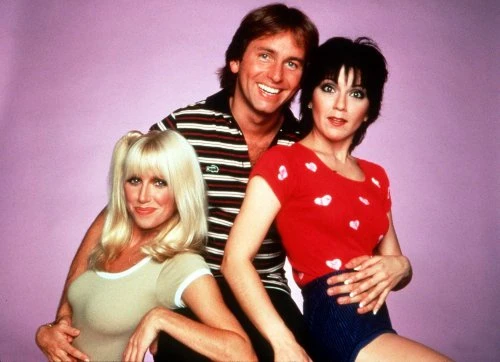
Silverman loved the new pilot. But the show--with the new title Three's Company--didn't go on the fall 1976 ABC schedule. Instead, it was launched as a mid-season replacement; the first of six episodes aired on March 15th, 1977. They did well with audiences; it ranked 11th for the season despite a short run. For the fall of 1977, ABC renewed Three's Company and slotted it on Tuesday nights at 9 PM (behind the two top-rated series on television at the time, Happy Days and Laverne & Shirley). The show shot up to third place in the ratings, and occasionally hit #1. But the show's success came at a price.
Critics tore into the thin plots and sexually charged dialogue. Today, the sexual references would be considered quite tame. But in 1977, Americans were just getting used to the idea that people of the opposite sex were living together before marriage. In addition, the term "gay rights" was becoming a major topic of discussion, thanks to efforts at the time by some American cities to grant equal rights to gay and lesbian people. (Conservatives were fighting those laws; the best-known effort came in Dade County, Florida, led by former Miss America and singer Anita Bryant.) So it was a bit controversial for Jack to don the swishy demeanour of a stereotypical gay man, to fool the clueless Mr. Roper into letting him stay in the girls' apartment.
There was no hanky-panky between Jack, Janet and Chrissy. And Jack was not gay--he was a typical heterosexual man of the late '70's who wanted to bed every female that crossed his path. Ditto his even more randy friend, car salesman Larry Dallas (Richard Kline). Things were far different in the Roper household, as poor Helen tried and tried to have sex with her impotent husband:
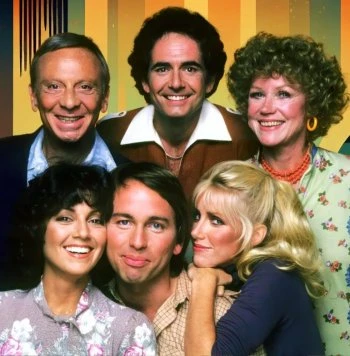
It was that dialogue, the endless double-entendres and misunderstandings, and the braless bouncing of Chrissy that brought in the audience. Not to mention controversy. Conservative groups blasted Three's Company for destroying young minds; a man known as the Reverend Donald Wildmon launched a group known as the "National Federation for Decency", and targeted the show's sponsors. It had little effect. What viewers did respond to was Suzanne Somers. As the sexy Chrissy, Somers became the latest "it girl", the media darling of the moment whose publicity began to eclipse that of her co-stars, complete with posters, T-shirts and movie offers--plus a cover story in "Newsweek". That sudden fame led to one of the most-celebrated departures of a series regular in American television history.
Flushed with her Three's Company success, Somers' fired her agent and had her actor-manager husband Alan Hamel represent her. Hamel demanded a new contract for Somers--with a raise from $30,000 an episode to $150-thousand per episode. That would have put Somers in the ranks of such well-paid actors of the period, including Carroll O'Connor (All In The Family) and Alan Alda (M*A*S*H). Plus, Hamel demanded 10% of the show's profits when it went into syndication. As negotiations continued between Hamel, the producers and ABC, pundits weighed in on whether Somers was worth so much money. And tensions rose behind the scenes. Somers, claiming a back injury, began missing work on the set. Ritter and DeWitt began snubbing Somers for her actions and refused to work with her. So for a time during the 1980-81 season, Somers' role was reduced; she was seen in the last few minutes of each episode. The storyline had Chrissy Snow going to Fresno, California to take care of her ill mother; she called the roommates from a separate soundstage. By this time, Somers was going on television talk shows, giving her side of the negotiations and putting down her producers and co-stars. Tired of it all, ABC and Three's Company's producers officially fired Somers in April 1981. For her replacement, actress Jenilee Harrison was brought in to play Chrissy's bumbling cousin, Cindy Snow, who came to stay with Jack and Janet while Chrissy was away. But viewers didn't think Harrison was as good as Somers (some speculated she was too young to do the sexual humour the show was famous for). In any case, the show's ratings began to fall.
By the fall of 1981, Priscilla Barnes was brought in as nurse Terri Alden, who replaced Cindy as the newest roommate. The change worked; ratings returned to near pre-Chrissy levels and Barnes became a permanent cast member. (Harrison was not so lucky; her Cindy character was seen occasionally during the 1981-82 season, then disappeared for good.) Another major cast change came in 1979 when Fell and Linley left Three's Company for their own spin-off show (more on that later). Veteran comic actor Don Knotts--best-known to TV viewers as bumbling Deputy Barney Fife on The Andy Griffith Show--stepped in as self-proclaimed ladies’ man Ralph Furley, the new owner of the apartment complex. (Like he did with Stanley Roper, Jack pretended to be gay so he could stay with the girls; Furley kept trying to "convert" Jack, unaware that Jack was not a "gay" Tripper.) A less successful addition to the cast that season was Ann Wedgeworth as Lana Shields, a sexually-active older woman with the hots for Jack. But the character didn't seem to fit into the mix, and Lana/Wedgeworth was written out before the end of the season.
Despite the controversy, the cast changes and the new decade, Three's Company continued to be a top-ten comedy for ABC. By this time, some critics began having a change of heart about the show, noticing and praising Ritter's talent for physical comedy. (So did the Academy of Television Arts & Sciences; Ritter won an Emmy in 1984 for best actor in a comedy series.) Even Lucille Ball--the Queen of Television Comedy--loved Three's Company so much, she gave the show her ringing endorsement by hosting a 1982 compilation special.
But by the fall of 1983, ratings for the show began to drop; the writers were having trouble finding new situations for Jack, Janet, Terri and Mr. Furley. (Jack did finally graduate from cooking school and opened his own restaurant, "Jack's Bistro"). Facing increased competition from NBC's A-Team-powered line-up, the producers and ABC decided to change formats, much as the British Man About The House became Robin's Nest. In the final episodes of the 1983-84 season, Jack met and fell in love with airline flight attendant Vicky Bradford (Mary Cadorette); and Janet became engaged to Philip Dawson (David Ruprecht). Janet and Philip tied the knot in a final hour-long episode on September 18th, 1984. Also in that episode, Jack agreed he and Vicky would live together; her parents' bitter divorce left her afraid of marriage. Terry didn't find love, but she decided to move to Hawaii and continue her nursing career. In the show's final moments, the three roommates say their tearful good-byes and turned out the lights, ending a successful eight-year run.
One week later, a new series took the place of Three's Company. Now called Three's A Crowd (a US version of Robin's Nest), it focused on the lives of Jack and Vicky. The new show starred Ritter, Cadorette and Robert Mandan as Vicky's father James, who bought the building that housed "Jack's Bistro" and the couple's upstairs apartment, providing him with an opportunity to get involved in the couple's lives. (It was one of the first American series where an unmarried couple lived under the same roof without the benefit of wedding vows--a sign that things were changing on television.) Ritter was a good as ever, and Cadorette was a perfect match. But Three's A Crowd's ratings were marginal at best. ABC announced it would pick up the show for a second season, but later changed its mind when it decided to air the sitcom Diff'rent Strokes after NBC cancelled it. As a result, Three's A Crowd ended its run after just one year and 22 episodes.
The other Three's Company spin-off was The Ropers (the American version of George and Mildred). An episode of Three's Company during the 1978-79 season set the stage for the new show. Stanley and Helen sold their Santa Monica apartment building and bought a condominium in an upscale Los Angeles neighbourhood called Cheviot Hills, owned by the snobbish Jeffrey P. Brookes III (Jeffrey Tambor). Brookes hated the couple from the start because of their lower-class mannerisms (they pulled up to the high-class condos in a battered, smoking 1956 DeSoto sedan). Stanley wasn't thrilled with the condos either, but Helen loved it and ended up buying the unit. The show basically revolved with Brookes' attempt to get rid of the Ropers; while Stanley and Helen continued their usual bickering over money and bedroom matters (she wanted sex and he didn't). But the Ropers had friends in Brookes' wife Anne (Patrica McCormack) and their son David (Evan Brookes). A midseason replacement that premiered on March 13th, 1979, The Ropers immediately landed into the top ten and won renewal for a second season. But ABC moved the show to Saturday nights, and the ratings quickly fell against NBC's highway patrol drama CHiPS. The final episode aired on May 22nd, 1980. Norman Fell and Audra Lindley returned to Three's Company in a March 1981 guest appearance, but the Ropers were not seen again. Despite the talents of its two leads, The Ropers was a case of good secondary characters who should have been used sparingly, not spun off into their own series.
Three's Company's infectious theme song ("Come and knock on our door/We've been waiting for you/Where the kisses are hers and hers and his/Three's Company, too!") was written by Don Nicholl and Joe Raposo, and sung over the title credits by Ray Charles (not the legendary R&B singer) and Julia Rinker.
John Ritter had this to say about Three's Company: "A lot of people I respect thought it was stupid. I'm proud of it now. I'm proud to know I've ruined generation after generation with mindless drivel".
Maybe it was mindless. But more than 40 years after its debut, Three's Company continues to draw viewers in reruns all over the world. Lucille Ball may have said it best when she noted in the show's 1982 retrospective episode: "It didn't set out to change the world, it just made us laugh and that's why we love it".
Seen this show? How do you rate it?
Seen this show? How do you rate it?
Published on February 6th, 2019. Written by Mike Spadoni (March 2003) for Television Heaven.


